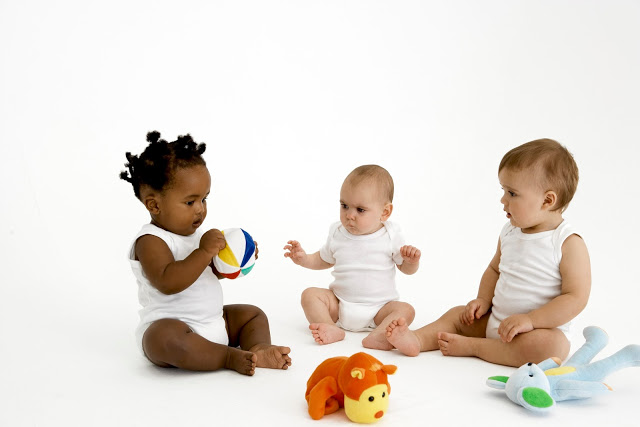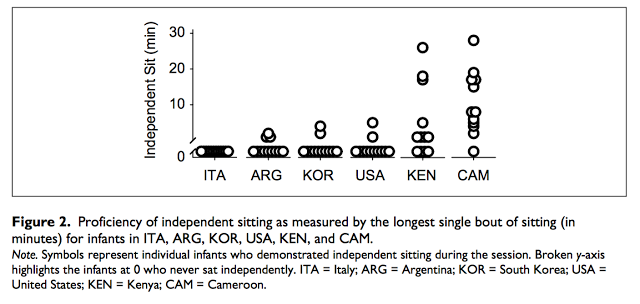Neuroscience
 Paediatricians' offices are often adorned with a developmental milestone chart for infants, and they always show the same "normal" age-typical progression, from sitting to crawling to walking. But these expectations (e.g. 25 per cent of infants achieve independent sitting by 5.5 months) are rather misleading because they're derived solely from research on Western babies conducted back in the 1930s and 1940s. A new study, published recently in the Journal of Cross-Cultural Psychology, aimed to broaden our understanding of what constitutes typical sitting ability, by observing five-month-old infants from six different cultures: Argentina, Cameroon, Italy, Kenya, South Korea, and the United States.
Paediatricians' offices are often adorned with a developmental milestone chart for infants, and they always show the same "normal" age-typical progression, from sitting to crawling to walking. But these expectations (e.g. 25 per cent of infants achieve independent sitting by 5.5 months) are rather misleading because they're derived solely from research on Western babies conducted back in the 1930s and 1940s. A new study, published recently in the Journal of Cross-Cultural Psychology, aimed to broaden our understanding of what constitutes typical sitting ability, by observing five-month-old infants from six different cultures: Argentina, Cameroon, Italy, Kenya, South Korea, and the United States.
Lana Karasik and her colleagues also departed from previous research by observing babies in their home environment rather than in a psychology lab. Specifically, a researcher local to each of the six cultures visited 12 mother and baby pairs in their homes for one hour. These sessions were taped and coded later based on where the babies were (i.e. in their mothers arms, on the ground, or on baby or adult furniture), their body position (sitting or lying etc) and how close their mother was to them. The mothers didn't know that the study was about infant sitting ability.
Overall, one third of the infants were able to sit independently, defined as sitting without support for at least one second. But there was significant cross-cultural variation. For example, just two of the US infants displayed independent sitting and none of the Italian infants, compared with 8 of the Kenyan infants (67 per cent) and 11 of the Cameroonian infants (92 per cent). There was also a wide-range of sitting proficiency, in terms of how long infants sat independently in a single bout. For example, the shortest bout was 2.4 seconds, while the longest was 28 minutes (achieved by a Cameroonian baby).
These cultural differences were mirrored by differences in the opportunities the infants were given to sit independently. For example, infants from the US, Argentina, South Korea and Italy spent most of their time in places that provided support, such as a strapped into child's furniture or in their mother's arms. By contrast, infants in Kenya and Cameroon spent most of their sitting time on the floor, or on adult furniture where they had to learn to balance themselves. Mothers in Kenya and Cameroon also tended to spend more time further away from their babies. One Kenyan mother spent 13 minutes out of reach of her baby as he sat independently on adult furniture (by the way, he didn't fall off the furniture, and neither did any other babies in this research).
It's tempting to infer that the cultural parenting practices in Kenya and Cameroon may have encouraged some of the infants in those cultures to acquire more precocious sitting abilities (on average). But of course this was a purely observational study with small samples, and we can't know whether the infants' abilities influenced their parents' behaviour or vice versa (in fact, it's probably a bit of both). It's also important to note, as the researchers do, that there was a huge amount of overlap in sitting ability across the cultures (e.g. some US infants sat independently longer than some Kenyan and Cameroonian infants), and there is also a large amount of variation within the cultures. Because of this, Karasik and her team say it is inappropriate to talk of babies in some cultures being uniformly more precocious than babies in others.
Infant sitting is a very important skill – it frees their hands to explore objects and interact more easily with adults. Given this, it seems amazing that most of what we know about the development of sitting ability is based on dated, lab-based research conducted almost exclusively in Western countries. "Had we not looked beyond onset ages [the simplistic idea that a child is either a sitter or not], ventured outside the laboratory, and studied samples of infants from six cultures across the globe," the researchers said, "we would never have known that at five months, some infants can safely sit on high benches for extended periods without the support of adults nearby."
_________________________________
Karasik, L., Tamis-LeMonda, C., Adolph, K., & Bornstein, M. (2015). Places and Postures: A Cross-Cultural Comparison of Sitting in 5-Month-Olds Journal of Cross-Cultural Psychology, 46 (8), 1023-1038 DOI: 10.1177/0022022115593803
--further reading--
Why do toddlers bother learning to walk?
For infants, walking is more than just another step in motor development
10 surprising things babies can do
How babies go sole searching
Toddlers don't take the risk of entrapment seriously
Post written by Christian Jarrett (@psych_writer) for the BPS Research Digest.
Our free fortnightly email will keep you up-to-date with all the psychology research we digest: Sign up!
- 10 Surprising Things Babies Can Do
Human infants are helpless. At first they can't even support the weight of their own heads. Crawling and walking take months to master. Compare this with the sprightly newborns of other mammals, such as kittens and foals, up and about within an hour...
- For Infants, Walking Is More Than Just Another Step In Motor Development
When an infant starts walking, this important achievement is more than just a milestone in motor control. According to Melissa Clearfield, the child's newfound locomotor skill arrives hand-in-hand with a raft of other changes in social behaviour and...
- One-year-old Babies Predict Other People’s Intentions
Babies as young as 12 months already have a rudimentary understanding of other people’s intentions. That’s according to Terje Falck-Ytter and colleagues who observed babies’ eye movements as they watched a video presentation of a person picking...
- How Babies Go Sole Searching
'From the Archives': first published in the Digest 16/02/04 Babies start using their feet to explore the world before they use their hands. That's according to James Galloway and Esther Thelen at the Universities of Indiana and Delaware, USA....
- Cognition In Babies
Newsweek's cover story for Aug 15 is all about "Your Baby's Brain". Reads like a literature review lite on cognition in babies -- fascinating, and simple enough for non-scientists to understand. That's the way I like my cognitive science!...
Neuroscience
Study uncovers dramatic cross-cultural differences in babies' sitting ability

Lana Karasik and her colleagues also departed from previous research by observing babies in their home environment rather than in a psychology lab. Specifically, a researcher local to each of the six cultures visited 12 mother and baby pairs in their homes for one hour. These sessions were taped and coded later based on where the babies were (i.e. in their mothers arms, on the ground, or on baby or adult furniture), their body position (sitting or lying etc) and how close their mother was to them. The mothers didn't know that the study was about infant sitting ability.
Overall, one third of the infants were able to sit independently, defined as sitting without support for at least one second. But there was significant cross-cultural variation. For example, just two of the US infants displayed independent sitting and none of the Italian infants, compared with 8 of the Kenyan infants (67 per cent) and 11 of the Cameroonian infants (92 per cent). There was also a wide-range of sitting proficiency, in terms of how long infants sat independently in a single bout. For example, the shortest bout was 2.4 seconds, while the longest was 28 minutes (achieved by a Cameroonian baby).
 |
| Figure from Karasik et al, 2015. |
It's tempting to infer that the cultural parenting practices in Kenya and Cameroon may have encouraged some of the infants in those cultures to acquire more precocious sitting abilities (on average). But of course this was a purely observational study with small samples, and we can't know whether the infants' abilities influenced their parents' behaviour or vice versa (in fact, it's probably a bit of both). It's also important to note, as the researchers do, that there was a huge amount of overlap in sitting ability across the cultures (e.g. some US infants sat independently longer than some Kenyan and Cameroonian infants), and there is also a large amount of variation within the cultures. Because of this, Karasik and her team say it is inappropriate to talk of babies in some cultures being uniformly more precocious than babies in others.
Infant sitting is a very important skill – it frees their hands to explore objects and interact more easily with adults. Given this, it seems amazing that most of what we know about the development of sitting ability is based on dated, lab-based research conducted almost exclusively in Western countries. "Had we not looked beyond onset ages [the simplistic idea that a child is either a sitter or not], ventured outside the laboratory, and studied samples of infants from six cultures across the globe," the researchers said, "we would never have known that at five months, some infants can safely sit on high benches for extended periods without the support of adults nearby."
_________________________________

Karasik, L., Tamis-LeMonda, C., Adolph, K., & Bornstein, M. (2015). Places and Postures: A Cross-Cultural Comparison of Sitting in 5-Month-Olds Journal of Cross-Cultural Psychology, 46 (8), 1023-1038 DOI: 10.1177/0022022115593803
--further reading--
Why do toddlers bother learning to walk?
For infants, walking is more than just another step in motor development
10 surprising things babies can do
How babies go sole searching
Toddlers don't take the risk of entrapment seriously
Post written by Christian Jarrett (@psych_writer) for the BPS Research Digest.
Our free fortnightly email will keep you up-to-date with all the psychology research we digest: Sign up!
- 10 Surprising Things Babies Can Do
Human infants are helpless. At first they can't even support the weight of their own heads. Crawling and walking take months to master. Compare this with the sprightly newborns of other mammals, such as kittens and foals, up and about within an hour...
- For Infants, Walking Is More Than Just Another Step In Motor Development
When an infant starts walking, this important achievement is more than just a milestone in motor control. According to Melissa Clearfield, the child's newfound locomotor skill arrives hand-in-hand with a raft of other changes in social behaviour and...
- One-year-old Babies Predict Other People’s Intentions
Babies as young as 12 months already have a rudimentary understanding of other people’s intentions. That’s according to Terje Falck-Ytter and colleagues who observed babies’ eye movements as they watched a video presentation of a person picking...
- How Babies Go Sole Searching
'From the Archives': first published in the Digest 16/02/04 Babies start using their feet to explore the world before they use their hands. That's according to James Galloway and Esther Thelen at the Universities of Indiana and Delaware, USA....
- Cognition In Babies
Newsweek's cover story for Aug 15 is all about "Your Baby's Brain". Reads like a literature review lite on cognition in babies -- fascinating, and simple enough for non-scientists to understand. That's the way I like my cognitive science!...
